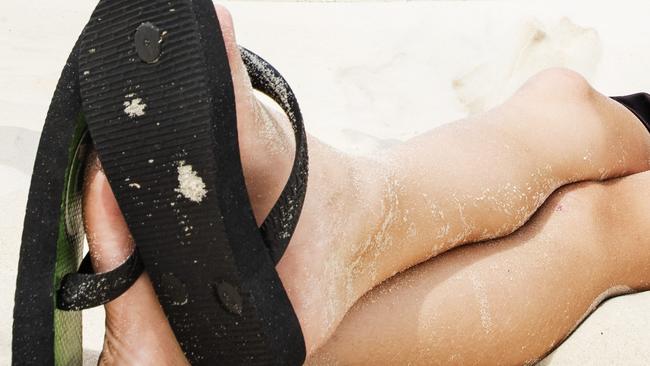SA travellers to Bali in biosecurity alert about risks of devastating foot and mouth disease
A holiday-maker returning from Bali with dirty thongs could be all it takes to unleash a devastating virus that threatens our lucrative agriculture sectors.
SA News
Don't miss out on the headlines from SA News. Followed categories will be added to My News.
South Australians returning from Indonesia have been urged to clean clothes and throw away footwear to stop a devastating animal virus destroying lucrative agriculture sectors.
In a new biosecurity alert, authorities have urged travellers, especially Bali holiday-makers, to be “hyper-vigilant” about importing foot and mouth disease, described as an animal Covid-19.
A Foreign Affairs and Trade Smartraveller alert on Wednesday urged passengers to “check before you pack to avoid bringing home items potentially exposed to biosecurity risks”.
Travellers must thoroughly clean clothes, consider ditching old dirty shoes, dispose of all meat or dairy products, declare any rural area visits in the previous 30 days and disclose any local items such as souvenirs.
Sniffer dogs have been deployed at various airports while biosecurity officers are boarding all returning Indonesia flights to help screen and highlight risks.
The warnings emerged after disease outbreaks ripped through two Indonesian provinces, including Bali, killing thousands of cows and infecting hundreds of thousands more.
The highly contagious disease affects cattle, sheep, goats, pigs, deer, buffalo and camels and is spread through close contact between animals.
It can spread via animal products or by the wind.
Figures show the country’s livestock industry is worth $32 billion annually while a quarter of the state’s produce is from red meat or wool.

Commonwealth authorities say there is no threat to humans, and such infections are “very rare” and not serious, but an outbreak would have “severe consequences” on livestock.
Official modelling projects a widespread FMD outbreak across the country would cost the economy more than $80 billion.
Livestock SA chief executive Travis Tobin, said it was a problem that affected everyone.
“It’s as serious as it gets for our livestock industries,” he said.
With school holidays and international borders reopening, travellers needed to be “hyper-vigilant”.
“It’s as easy as thoroughly cleaning clothes and footwear before boarding the flight home and, once they get here, to stay away from farms for at least a month,” he said.
“Better still, I would encourage returning travellers from Indonesia to throw out their footwear before they come home.”
Comparing it to Covid-19 in humans, he said it posed a “significant socio-economic risk to Australia” without necessary precautions or hygiene measures to stop it quickly spreading.
He said an outbreak would mean exports would be “shut down overnight”.
“The implications of this to our economy and rural communities would be brutal and far reaching, with many businesses unlikely to be able to recover,” he said.
Announcing a #ThrowYourThongs campaign, National Farmers’ Federation president, Fiona Simson, said an outbreak was a “nightmare scenario”.

She said: “(It) loves to hitchhike on shoes. That means your dirty old holiday pluggers could be the thing that brings this disaster to our shores. Don’t risk it.
“Throw out those tired old thongs. Bin them at the airport or your hotel and post proof on social media, and we’ll help you buy a shiny new pair. It’s that simple.”
State Primary Industries Minister Clare Scriven urged travellers to stay extra vigilant when returning from Indonesia or Bali as officials closely monitor the evolving situation.
“An FMD outbreak in Australia would have devastating impacts on Australia’s livestock industry with severe economic losses,” she said.
“We are working closely with state peak industry bodies and nationally through working groups to contribute to both national and state preparedness.”
Agriculture Minister Senator Murray Watt, has travelled to Jakarta for crisis talks with the Indonesian government.
“It’s a two-pronged approach, tough measures at home, and firm action and support abroad,” he said.
“We know how serious this is and we are determined to stop it getting into our country.”
Australia has never reported an outbreak in modern times.
Possible “minor” outbreaks are believed to have occurred in Australia in 1801, 1804, 1871 and 1872.
A 2001 British outbreak caused livestock losses of more than £8b ($19b).
Outbreaks are also common in Africa, the Middle East and Asia including Taiwan, Japan as well as Korea.





